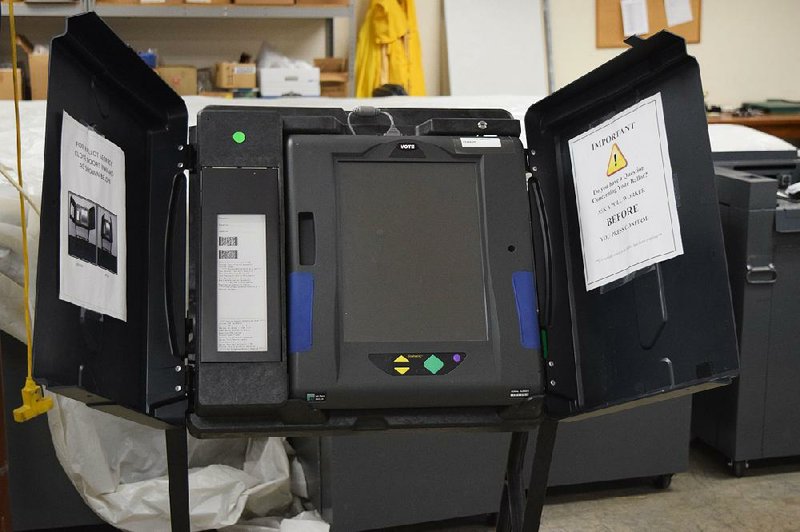Pulaski County has signed a contract to buy some new voting equipment, which is expected to be in play during this year's general election.
County chief executive Barry Hyde signed a sales agreement Feb. 11 outlining the purchase of 140 ballot scanners, 300 electronic poll books, 265 voting machines, 75 printers and some software.
The agreement resolves months of discussion -- as well as some confusion -- about when and how best to replace aging election equipment in the state's most populous county.
"Our voters in November will be using all-new equipment, which suggests the urgency of going ahead and getting this purchase made, so hopefully it's sitting on the shelves of our warehouse," Hyde said in January.
"We don't want to jeopardize giving all the time available to the elections staff, and the election commission, to do proper training on all-new equipment to ensure that we have reliable, accessible elections."
Roughly $1.56 million in state funding plus about $300,000 in appropriated county funds will pay for the equipment. The state dollars were allocated through Act 808 of 2019 to help 21 counties update their voting stock.
Conversations about new equipment in Pulaski County persisted through last year, briefly stalling when Hyde, election commissioners and other officials thought they'd be asked to match the $1.56 million to receive it.
That was incorrect, but the election commission kept mulling over the purchase at meetings last fall, when Republican-appointed chairwoman Evelyn Gomez lobbied for the group to wait and see if carryover funds could beef up its budget.
The situation came to a head in a tense conversation between Hyde and Gomez at a Jan. 28 Quorum Court meeting. Hyde said he was moving ahead with the order, while Gomez asked what equipment was being purchased.
Gomez said in a later interview that the panel is "grateful to have machines that aren't breaking down," but she wished the commission had first been able to present ideas to the Quorum Court to ask for additional funding.
"Apparently we didn't get a chance to do that, and [Hyde] just went ahead and made a decision on what he wanted," she said.
"There's room to have even more, and better, for the county," she added. "I don't think the bare minimum is ever the best, but we're excited about where we are."
Democratic-appointed election commissioner Joshua Price later said he'd been perplexed by the confrontation, recalling a Jan. 24 commission vote that settled on quantities of machines to use "as the basis for a plan to start the process of obtaining new voting equipment with the opportunity for expansion," according to meeting minutes.
"This is what we discussed, and we voted on it, and it's in the minutes, so I'm not quite sure what the disconnect was there," he said. "We can't just keep delaying, delaying."
"Let's get what we need for a one-to-one replacement so we can carry on our election process as we have been, but with modern equipment."
Some new equipment, Price has said, will help with data collection to inform consideration of a potential move to a vote center model in the county, though he says that won't happen without extensive public input or before 2021.
Separately on Tuesday, a committee of Pulaski County justices of the peace advanced an ordinance dealing with last year's carryover funds that creates a reserve for future election equipment purchases, among other things.
The full Quorum Court must vote to approve that move.
Metro on 02/18/2020

